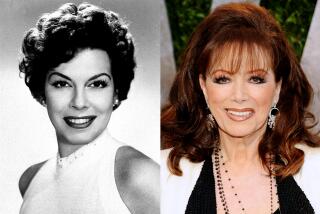A Primer on How to Do Nothing ‘90s-Style : Behavior: Sarah Dunn’s well-researched manual offers a satirical look at adopting the lifestyle that’s based on self-determined lethargy.
PHILADELPHIA — Twentysomethings have barely recovered from the “Generation X” backlash inflicted by Douglas Coupland’s novel when along comes “The Official Slacker Handbook” and its own special set of generational generalizations.
The satirical primer provides lists and how-to essays on slacking ‘90s style: how to forestall utility termination, how to wear a proper goatee, how to mooch off your parents, friends and the government with the least amount of effort.
First, a working definition. (You slackers, if you’ve been industrious enough to read this far, congratulations and skip to the next paragraph.) “It is the inalienable right of every man, woman and child,” writes Sarah Dunn in the introduction, “to work as little as humanly possible. (This book) will help you in your transformation from gainfully employed sane person to poverty-stricken malcontent.”
Slackers are the people you see at coffee shops and cafes, writing poetry, thinking about their next great film, reading Celine’s “Journey to the End of the Night” and being dutifully late for their shift as usher at the movies.
“I didn’t coin the term, and I didn’t create this (phenomenon),” says Dunn, 25. A self-professed non-slacker, she hung out in coffee shops across the United States and interviewed dozens of people who led a slacker lifestyle, out of which came the idea for the manual.
And, according to Dunn, what validates slacking in the 1990s--and sets it apart from just your pedestrian, run-of-the-mill, sloth-like behavior--is that its attendant emotional, spiritual and occupational lethargy is purely self-determined. Slackers don’t slack because they can’t get good jobs; they slack because good jobs would cut into the time they’ve scheduled for reading or thinking or drinking coffee.
“It’s a very seductive lifestyle,” she says. “It’s choosing intellectualism and embracing a higher value than whether or not you have a cellular phone. You can spend your time with friends and have a meaningful existence.”
Sound familiar? The book glibly compares modern-day slackers--in Philadelphia; Austin, Tex.; Portland, Ore., and Baltimore--to the slackers of Cambridge in the 1790s, Paris in the 1920s and San Francisco in the 1960s. Same geist, different Zeit.
But back to the question: Will the book present twentysomethings another battle with yet another label?
No, says Dunn, and what will save the book, according to many slackers, is its erudition, humor and self-deprecatory approach. “I might not exactly reflect what you slackers are really like,” the book seems to say, “but I’m earnest, brilliantly funny and don’t take myself too seriously, and somehow that makes me OK. Doggone it, people like me.”
But Dunn acknowledges that many people have been--and certainly will be--stridently opposed to a book ostensibly meant to stereotype and pin another label on their backs.
“But it’s meant to be satire,” she says. “And people who say, ‘We can’t be defined, we transcend language and classification,’ seem to me incredibly pretentious and wrong. I think it is possible to make distinctions by what a group reads, does, wears or how it has sex. How valid that classification should be, that’s the real issue.”
Between waiting tables at night and writing in the morning--such fitting pastimes for an English lit grad from the University of Pennsylvania--Dunn started hanging out in a neighborhood cafe, where she became fascinated with both the number and intensity of slackers. She made friends with them and, as her time at the cafe grew, so did her network.
She took time to travel to other slacker cities (the list is on page 58 of the book) and talked to dozens of slackers who opened up their lives and their coffee bars to her.
Research is infused throughout the book. “Even stuff that came out of my head indirectly came from being around slackers,” she says. “I knew that the biggest way I would fail is if slackers picked up on (wrong details). A lot of the research that went into this book was terribly liberating.”
For example, going a day or two without showering doesn’t bother her anymore. And when she worked as a waitress in a Philly restaurant, she started following her co-workers’ example of not wearing underwear. (“Why We’ve Stopped Wearing Underpants” appears on page 43.)
Her dedication to detail and deep interest in the culture of slack have garnered many slacker kudos, often coming from corners Dunn had not expected.
“I was prepared to hate this book,” says Richard Linklater, slacker and director of the 1991 film “Slacker,” about the wayward lives of his Austin slacker brethren. She “has managed to fuse frighteningly on-target observations with a historical perspective that is so often lost when people talk about slackers.”
The book, however, also draws guffaws and rolled eyes from other twentysomethings.
“Oh God, I can’t believe someone wrote something like that,” says Erin Rogers, a twentysomething. “I want to say she’s selling out, and wasn’t the ‘Generation X’ backlash bad enough?”
But Dunn says it’s the praise that comes from people predisposed to hating its concept that gives her hope the book will be seen as a farce with just enough veracity to hold its currency. For now, she’ll continue to slack and drink coffee as she works on her next book.
And she has, by the way, gone back to regularly donning underwear.
More to Read
Sign up for our Book Club newsletter
Get the latest news, events and more from the Los Angeles Times Book Club, and help us get L.A. reading and talking.
You may occasionally receive promotional content from the Los Angeles Times.






